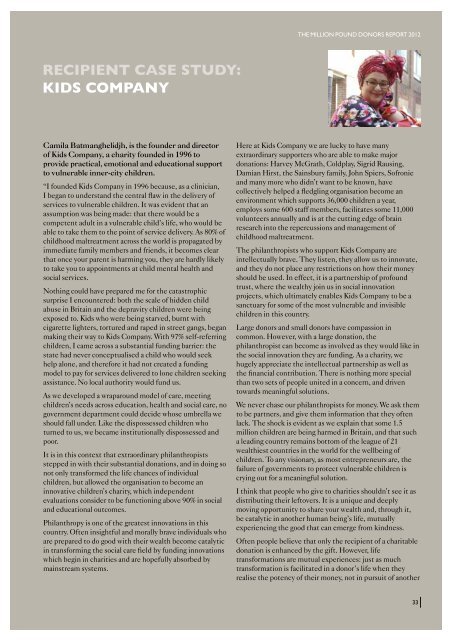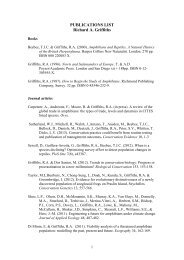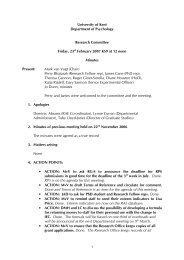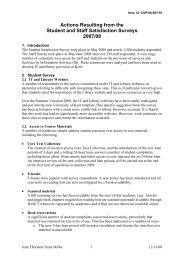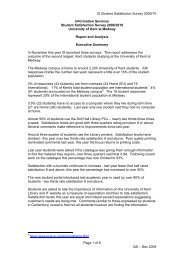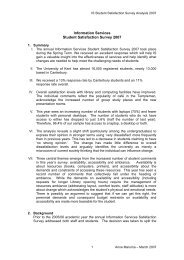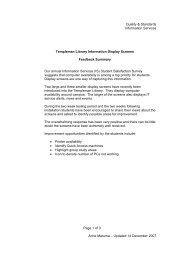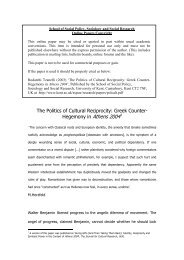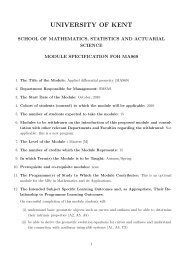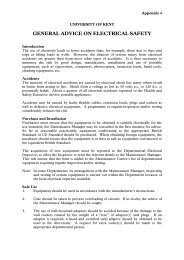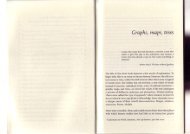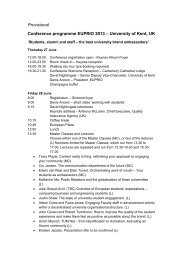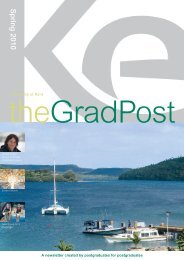The Million Pound Donors Report 2012 - University of Kent
The Million Pound Donors Report 2012 - University of Kent
The Million Pound Donors Report 2012 - University of Kent
Create successful ePaper yourself
Turn your PDF publications into a flip-book with our unique Google optimized e-Paper software.
RECIPIENT CASE STUDY:<br />
KIDS COMPANY<br />
Camila Batmanghelidjh, is the founder and director<br />
<strong>of</strong> Kids Company, a charity founded in 1996 to<br />
provide practical, emotional and educational support<br />
to vulnerable inner-city children.<br />
“I founded Kids Company in 1996 because, as a clinician,<br />
I began to understand the central flaw in the delivery <strong>of</strong><br />
services to vulnerable children. It was evident that an<br />
assumption was being made: that there would be a<br />
competent adult in a vulnerable child’s life, who would be<br />
able to take them to the point <strong>of</strong> service delivery. As 80% <strong>of</strong><br />
childhood maltreatment across the world is propagated by<br />
immediate family members and friends, it becomes clear<br />
that once your parent is harming you, they are hardly likely<br />
to take you to appointments at child mental health and<br />
social services.<br />
nothing could have prepared me for the catastrophic<br />
surprise I encountered: both the scale <strong>of</strong> hidden child<br />
abuse in Britain and the depravity children were being<br />
exposed to. Kids who were being starved, burnt with<br />
cigarette lighters, tortured and raped in street gangs, began<br />
making their way to Kids Company. With 97% self-referring<br />
children, I came across a substantial funding barrier: the<br />
state had never conceptualised a child who would seek<br />
help alone, and therefore it had not created a funding<br />
model to pay for services delivered to lone children seeking<br />
assistance. no local authority would fund us.<br />
As we developed a wraparound model <strong>of</strong> care, meeting<br />
children’s needs across education, health and social care, no<br />
government department could decide whose umbrella we<br />
should fall under. Like the dispossessed children who<br />
turned to us, we became institutionally dispossessed and<br />
poor.<br />
It is in this context that extraordinary philanthropists<br />
stepped in with their substantial donations, and in doing so<br />
not only transformed the life chances <strong>of</strong> individual<br />
children, but allowed the organisation to become an<br />
innovative children’s charity, which independent<br />
evaluations consider to be functioning above 90% in social<br />
and educational outcomes.<br />
Philanthropy is one <strong>of</strong> the greatest innovations in this<br />
country. Often insightful and morally brave individuals who<br />
are prepared to do good with their wealth become catalytic<br />
in transforming the social care field by funding innovations<br />
which begin in charities and are hopefully absorbed by<br />
mainstream systems.<br />
the MIllIon PoUnd donors rePort <strong>2012</strong><br />
Here at Kids Company we are lucky to have many<br />
extraordinary supporters who are able to make major<br />
donations: Harvey McGrath, Coldplay, Sigrid Rausing,<br />
Damian Hirst, the Sainsbury family, John Spiers, S<strong>of</strong>ronie<br />
and many more who didn’t want to be known, have<br />
collectively helped a fledgling organisation become an<br />
environment which supports 36,000 children a year,<br />
employs some 600 staff members, facilitates some 11,000<br />
volunteers annually and is at the cutting edge <strong>of</strong> brain<br />
research into the repercussions and management <strong>of</strong><br />
childhood maltreatment.<br />
<strong>The</strong> philanthropists who support Kids Company are<br />
intellectually brave. <strong>The</strong>y listen, they allow us to innovate,<br />
and they do not place any restrictions on how their money<br />
should be used. In effect, it is a partnership <strong>of</strong> pr<strong>of</strong>ound<br />
trust, where the wealthy join us in social innovation<br />
projects, which ultimately enables Kids Company to be a<br />
sanctuary for some <strong>of</strong> the most vulnerable and invisible<br />
children in this country.<br />
Large donors and small donors have compassion in<br />
common. However, with a large donation, the<br />
philanthropist can become as involved as they would like in<br />
the social innovation they are funding. As a charity, we<br />
hugely appreciate the intellectual partnership as well as<br />
the financial contribution. <strong>The</strong>re is nothing more special<br />
than two sets <strong>of</strong> people united in a concern, and driven<br />
towards meaningful solutions.<br />
We never chase our philanthropists for money. We ask them<br />
to be partners, and give them information that they <strong>of</strong>ten<br />
lack. <strong>The</strong> shock is evident as we explain that some 1.5<br />
million children are being harmed in Britain, and that such<br />
a leading country remains bottom <strong>of</strong> the league <strong>of</strong> 21<br />
wealthiest countries in the world for the wellbeing <strong>of</strong><br />
children. To any visionary, as most entrepreneurs are, the<br />
failure <strong>of</strong> governments to protect vulnerable children is<br />
crying out for a meaningful solution.<br />
I think that people who give to charities shouldn’t see it as<br />
distributing their leftovers. It is a unique and deeply<br />
moving opportunity to share your wealth and, through it,<br />
be catalytic in another human being’s life, mutually<br />
experiencing the good that can emerge from kindness.<br />
Often people believe that only the recipient <strong>of</strong> a charitable<br />
donation is enhanced by the gift. However, life<br />
transformations are mutual experiences: just as much<br />
transformation is facilitated in a donor’s life when they<br />
realise the potency <strong>of</strong> their money, not in pursuit <strong>of</strong> another<br />
33


